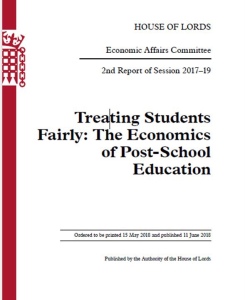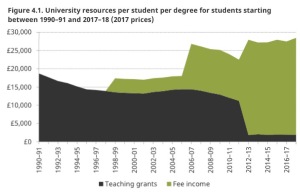Higher education policy debates have become remarkably shouty. Perhaps people fear that unless they identify massive structural problems and propose sweeping reforms, all in a very loud voice, nobody will take any notice. Usually nobody takes any notice anyway.
If you thought that the House of Lords might offer something altogether more elevated, you would be very much mistaken. Its Economic Affairs Committee report, Treating Students Fairly: The Economics of Post-School Education, published last week, is very much a product of its time. The lords listened to some shouty people, saw nothing but trouble, and shouted a little themselves.
Like so many commentators on higher education, these lords can’t quite work out what they want to shout about. The report’s most significant points are financial: the loans system, the effect of abolishing maintenance grants, the squeeze on further education, and misuses of the apprenticeship levy. These are hugely important matters, but all too often their arguments suffer from sketchy research and lack of depth. The paint scrapes away all too easily; for example, Nick Hillman took just a few days to pick apart one of the report’s key arguments about further education funding.
We might equally examine the question of fees. This was a subject they could so easily have left alone; I mean, why enter this quagmire, when there were more urgent and original lines to pursue? In the space of a few paragraphs, they quote the unquestionable expert Andrew McGettigan, the splenetic Andrew Adonis, a parent who has just discovered the notion of ‘self-guided study’, and a student who happened to write in to say he reckoned fees should be somewhere around £3000. On the back of this research, and with not a thought to calculating the impact of real-terms funding cuts on the quality of British universities, the lords stick their fingers in the air and conclude that fees should remain frozen ‘for the medium-term’.
My point is that they did not need to dive down the rabbit-hole marked ‘value-for-money’, nor listen to mad hatters in their own House. And their adoption of the methodology of talkback radio merely prompts the reader to question their evidence elsewhere. For instance, I’m broadly sympathetic to the argument that maintenance grants should be reintroduced; however, the report’s evidence for the impact of abolishing grants is almost exclusively anecdotal. It also rests rather too heavily on a desire for all graduates to emerge from university entirely equal, which is to ignore the desperate inequalities which the British economy otherwise nurtures (and, frankly, which their House represents). We might call this the ‘universities must fix everything’ delusion: it’s rather common.
The report also betrays a whiff of disdain for universities and those who choose to spend their time at them. In a familiar manoeuvre, universities are simultaneously attacked for not creating a market in terms of pricing, and slated for daring to operate rationally in response to the government’s market-based reforms. How dare we set our fees at £9000? How dare we all want to be universities in the first place?
Students, meanwhile, are manifestly being had. Why, the lords ask, ‘are people continuing to pursue undergraduate degrees if future employment benefits are uncertain?’ At heart these are serious debates; they are correct to point out that the link between graduate numbers and economic growth is no longer as solid as it once was. Nor are they alone in wanting to raise the profile and status of apprenticeships. Fair enough, but their decree that schools ‘must present all post-16 and post-18 options as equal’ occupies the realm of dictatorial fantasy, while the report’s tone is dismissive of those who dare to aspire to higher levels of education. Might they have given, perhaps, a moment’s thought to how it might look for a handful of the most privileged people in the country to dismiss some young people as ‘overeducated’? I have an inkling my own students would not take that too well.
There’s not much respect for student achievement either. Grade inflation – another of the report’s unnecessary crusades – surely cannot be the result of students’ ability and labour, can it? On the basis of precisely no evidence whatsoever, they propose that this pattern ‘may’ be a result of universities being ‘incentivised … to attract prospective students’. It ‘may’; seriously, they’re worrying about grade inflation, yet they have the temerity to put this sort of unfounded speculation in an official report. And of the student voice? Well, the National Student Survey is clearly unreliable, because they heard an anecdote about a university that pays students £5 to complete it. The assumptions that this story is true (interestingly, they do not dare to name the university), and that students could so easily be bribed, are worthy of the Daily Mail. The fact that the subsequent paragraphs hopelessly confuse the NSS with the Teaching Excellence Framework rather confirms the damage to the report’s credibility.
But there is perhaps even more disdain for the government. The Augar Review, the government’s ‘major’ effort to rethink student finance, is not even mentioned. Moreover, the extravagant, largely uncosted recommendations in Treating Students Fairly seem cruelly framed to make Augar’s team, hamstrung as they are by a requirement that no more money can be spent, appear niggardly. Nor do the lords have any time for sparkling new administrative structures. The Institute for Apprenticeships – barely a year old – ‘should be abolished’. The Office for Students ‘should’ have its ‘remit … extended to regulate and fund all higher education’. I mean, guys, I know the Office for Students doesn’t have a lot of friends, but maybe we could give it a few more weeks before pulling it all apart.
By the end, the shouty tone and spirit of revolution leave the reader perplexed, struggling to make sense of some genuinely important recommendations against the background noise. There must be better ways of engaging with these debates, and also more effective ways of connecting with those running the show. At risk of being accused of grade-inflation, I’d give it a 55.
Apologies: it’s taken me a couple of months to upload this, after it was first published on wonkhe.com. Truth be told, I couldn’t work out how to edit pictures on a new computer. Then I got distracted by grant applications and end of year stuff; you know how it is.






